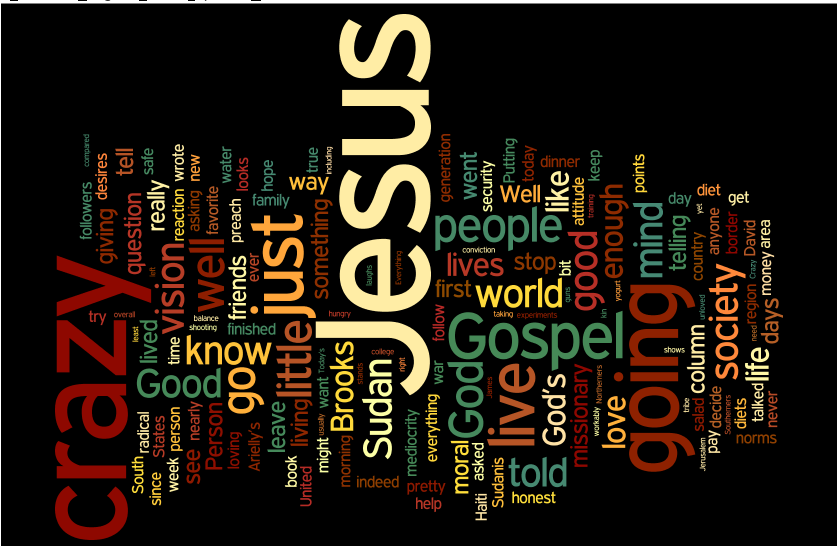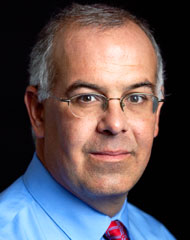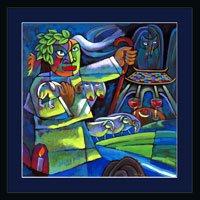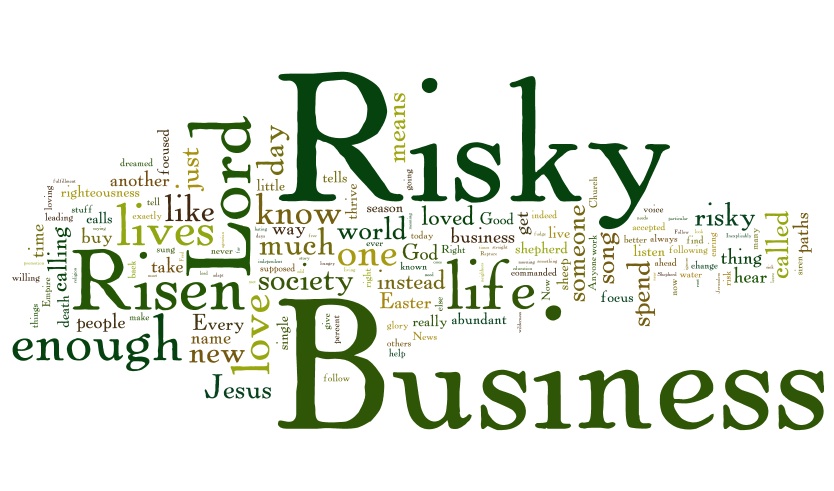One of my favorite theologians posed the question about this morning’s Gospel the other day, asking, “Do you have to be a little crazy to preach the Gospel?”[1]

To which my response was, “Crazy to preach the Gospel? Nah. But you do have to be crazy to live the Gospel!”
Because, let’s be honest, from the days of Jesus himself, anyone who dared to live the Gospel, the Good News of God in Christ Jesus, not just proclaiming God’s love but actually living it, was considered crazy.
The Gospel, you see, is not something that fits in well with society. Never has … never will.
Society in the days when our Lord and Savior walked the earth was exactly like it is today. In fact, I hate to tell you, but society has pretty much been the same since … well, ever since Cain killed Abel: It’s been about putting ourselves first. Putting our kith and kin first. Putting our tribe first. Today’s society, just like society in Jesus’ day, is based on the attitude of, I’ve-got-mine-and-I-don’t-care-if-you-ever-get-yours!
Everything that Jesus did in his ministry – feeding the hungry, giving water to the thirsty, making the blind see, the deaf hear, the mute speak, the lame leap for joy, including the excluded, loving the unloved, cleansing the unclean, giving hope to those who have known no hope from generation to generation – everything Jesus did went against societal norms. That’s why the scribes came down from Jerusalem … because Jesus didn’t fit the norms.
And I am telling you: If we really live the Gospel – not just proclaim it but live it – I guarantee you, you, like Jesus, will be called crazy. People will say that you are out of your mind.
When I told my family and friends and my parish that I was going to Sudan to be a missionary, they told me I was crazy. Sudan wasn’t safe. It wasn’t stable. It was a country riven by nearly 50 years of war, war that had not quite ended.
When I went to missionary training – if you want to serve as an Appointed Missionary of The Episcopal Church, you have to go to a two-week “missionary boot camp” – they brought in a security trainer who looked just like Daniel Craig, the new James Bond, who talked to us about security issues and how we could keep ourselves safe. We each were allowed to tell him where we would be serving, and he would tell us something about the area where we were going. When I asked about Sudan, he said, “Well, I wouldn’t go to the border region … it’s really unstable and you never know what’s going to happen there. Where are you going?”
When I told him, “the border region,” all he could say was, “Well, good luck.”
When I lived in Sudan, the Sudanis themselves told me I was crazy, Northerners because I was living in the South, Southerners because … well, because I was living in the South. There was no clean water, very little food, the area was very insecure, we had very little electricity, and people were pointing guns at me all the time.
At least once a week, the Sudanis would ask me: “Why are you here? Why haven’t you left yet?”
When I did leave Sudan, and transferred to Haiti, my family and friends again told me I was crazy. “Why do you want to go to the poorest country in the Western Hemisphere?”
And then when I got to Haiti, the Haitians themselves asked me: “Are you crazy? Why would you leave the comforts of the United States to come here?! We’re trying to leave here to go to the United States?”
You have encountered this reaction as well, haven’t you?
Every time you decide to do something because Jesus says so, isn’t it true that people question you?
You’re generous people, I know, so when you stop to help a homeless person on the street, giving them $20, someone somewhere asks, “Are you nuts? He’s just going to drink that money, you know.”
When you stop along the road to help a stranded driver, taking them to get some petrol, isn’t it true that your parents or spouse looks at you and says, , “Are you crazy? That person could have been an ax murderer!”
You decide to tithe to your church, and then you go to see your broker, who looks at you and says, “Are you out of your mind? Did you stop to think that you might need that money someday, you know, to retire? Or to pay for your kids’ college education? Or to pay for that wedding you’re daughter’s been dreaming of all her life?”
I am telling you: Living the Gospel … every moment of your lives … is … well, it’s just crazy!
Look what happened to Jesus – his love for God’s people led him to the cross!
If we are going to be Christians, if we are going to truly be followers of Jesus, we are going to have to be just a little bit crazy.
• • •
Last week, David Brooks wrote a column in The New York Times entitled “The Moral Diet.”
In it, he talked about David Arielly’s new book, The (Honest) Truth About Dishonesty, a book that shows that “nearly everybody cheats, but usually only a little.”[2]
Arielly’s social science experiments show that people these days “live by the Good Person Construct, try[ing] to balance their virtuous self-image with their selfish desires. They try to manage the moral plusses and minuses and keep their overall record in positive territory.”[3]
Brooks compared how we live our moral lives to the way we follow our diets. We have all dieted, right? So we know how this works. We get up in the morning, and we have a banana and yogurt for breakfast. Then for lunch, we have a salad – a small salad – no dressing, please, because I’m on a diet. For dinner, we have a piece of baked chicken and some broccoli. And then what do we do? We count up our calories and we realize we’ve been really good today, so we say, “I can have ice cream for dinner!”
Brooks points out that what we do with our diets, we do with the rest of our lives.

The Good Person, he wrote, “isn’t shooting for perfection any more than dieters are following their diet 100 percent. It’s enough to be workably suboptimal, a tolerant, harmless sinner and a generally good guy.”[4]
Brooks finished his column with this thought: “As we go about doing our Good Person moral calculations, it might be worth asking: Is this good enough? Is this life of minor transgressions refreshingly realistic, … or is it settling for mediocrity?”[5]
I have to say, when I finished reading the column, my reaction was: “’Good enough’ is not good enough. Not if we are going to live our lives as followers, as disciples of Jesus.”
Because Jesus didn’t do mediocrity.
Jesus, my friends, went the whole way. He lived his life – and he died for us – as a crazy radical, loving beyond anything the world had ever seen.
And Jesus is calling us to be just as crazy and just as radical as he was!
And when we do this, and the world laughs at us or scoffs at what we are doing, or ridicules us and says, “You’re out of your mind” (which the world will do)? Well, Jesus basically is telling us to respond to the world by saying, “So what?”
So what if the world around you thinks you are out of your mind?
So what if your actions and your attitude makes people say, “You are out of your mind!”
This is what Jesus commanded us to do, and if we are going to follow Jesus, this is what we’re going to have to do.
Be a little bit crazy.
• • •
My favorite theologian points out that Jesus’ life was centered in a very specific vision, and that “at the heart of that vision and way is the conviction that God is love, that God desires the health and healing of all God’s creation, that God stands both with us and for us, that God is determined to love and redeem us no matter what the cost, and that this God chooses to be accessible to us, to all of us – indeed to anyone and everyone.”[6]
Let’s be honest:
That vision – it’s pretty crazy.
Because it goes against everything society says.
But that indeed is God’s vision, and it was that vision that Jesus lived, and taught us to live as well.
So the question for us on this Sunday morning is this:
Are you willing to be crazy for Jesus?
Are you?
Amen.
Sermon preached at Trinity Episcopal Church, Manassas, Va., on the Second Sunday after Pentecost, Proper 5, Year B, 10 June 2012.
[1] David J. Lose, Marbury E. Anderson Biblical Preaching Chair, Luther Seminary, “Out of our minds,” http://www.workingpreacher.org/dear_wp.aspx?article_id=596
[2] David Brooks, “The Moral Diet,” http://www.nytimes.com/2012/06/08/opinion/brooks-the-moral-diet.html?_r=2&nl=todaysheadlines&emc=edit_th_20120608me
[3] Ibid.
[4] Ibid.
[5] Ibid.
[6] Lose (emphases added)







